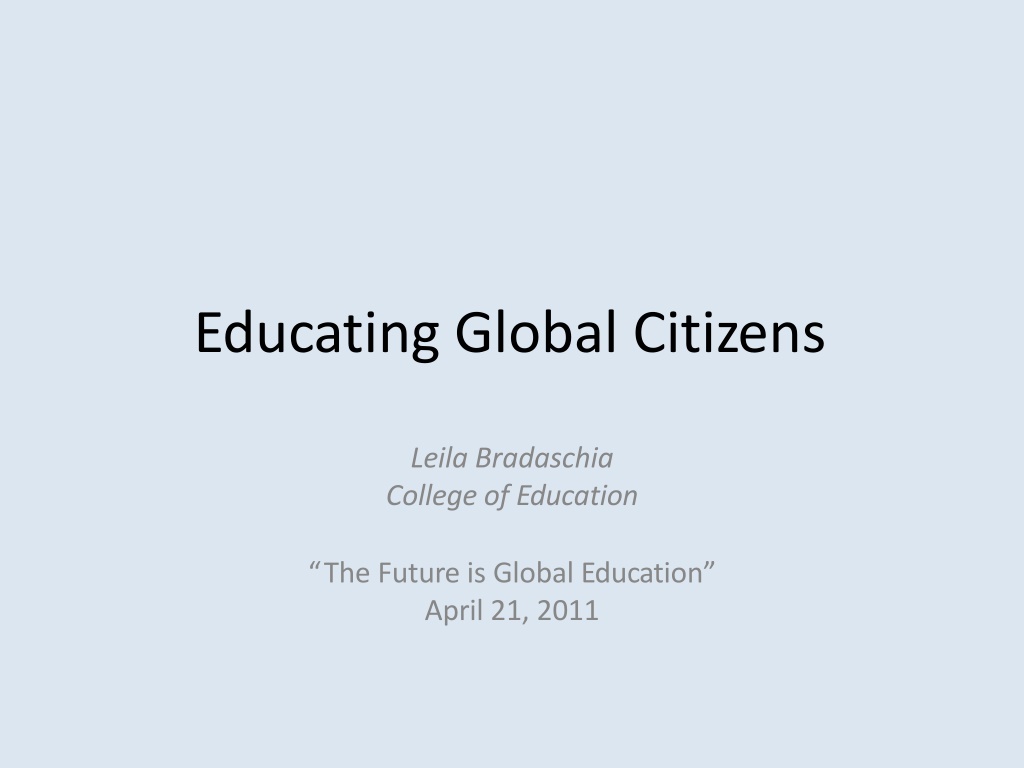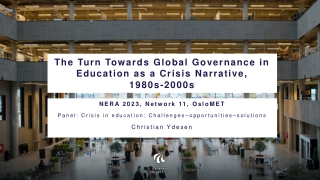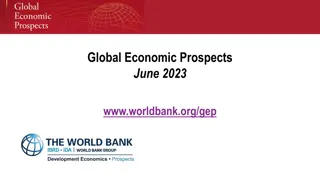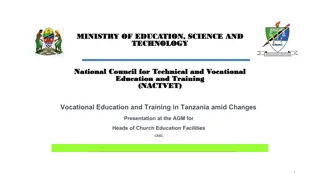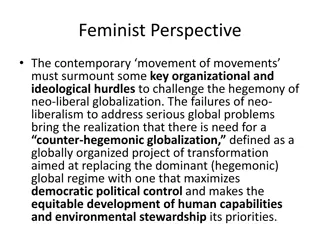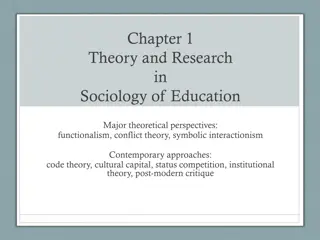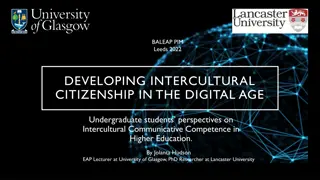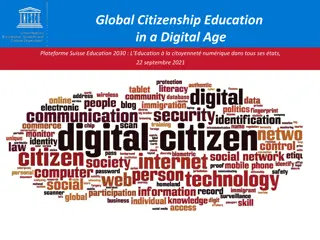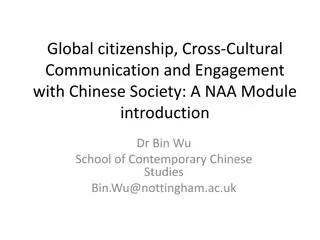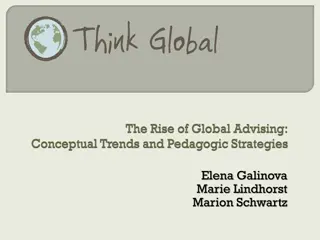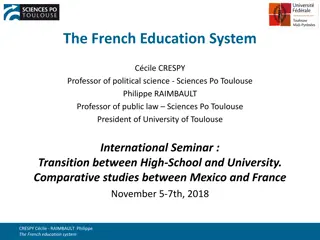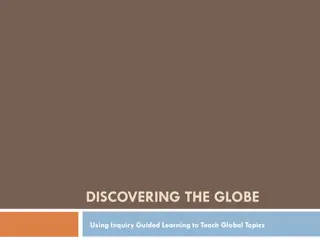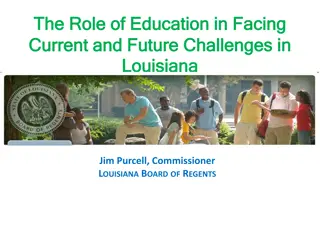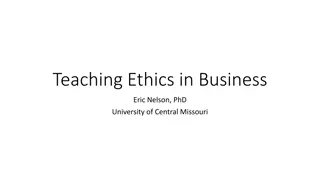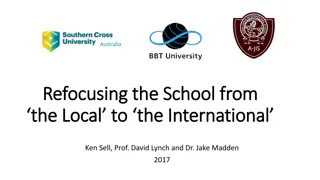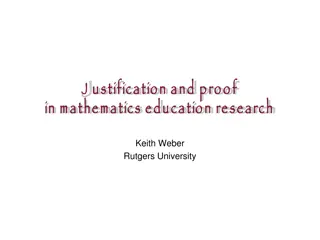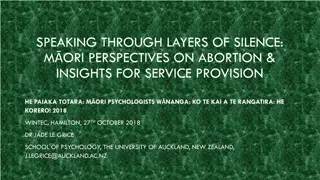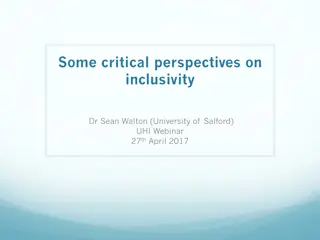Exploring Global Education Perspectives and Challenges
The discussion delves into the evolving concept of global education, examining the necessity for a global perspective in contemporary schooling. Various scholars' viewpoints are explored, highlighting the complexities and demands associated with integrating global dimensions into educational frameworks. The research questions focus on defining global education, citizenship, and educators' perspectives, revealing insights into the characteristics of an ideal global citizen and the perceived attitudes of Americans towards global education.
Download Presentation

Please find below an Image/Link to download the presentation.
The content on the website is provided AS IS for your information and personal use only. It may not be sold, licensed, or shared on other websites without obtaining consent from the author. Download presentation by click this link. If you encounter any issues during the download, it is possible that the publisher has removed the file from their server.
E N D
Presentation Transcript
Educating Global Citizens Leila Bradaschia College of Education The Future is Global Education April 21, 2011
The need for education that promotes a global perspective is increasingly apparent. What is less clear is just what constitutes such a perspective, particularly one which young people might be able to attain in the course of their formal and informal education. - Robert Hanvey (2001)
Pike (2000) A major difficulty in any study of global education lies in the use of the terminology itself and its interpretation (64). Global education challenges the school s traditional role in the shaping of national identity and demands that teacherreflection take place at unusually sophisticated levels (70).
Nussbaum (1994) Defines cosmopolitan education as [American] students being taught not that they are above all citizens of the United States, rather they are above all, citizens of a world of human beings, and while they happen to be situated in the United States, they have to share this world with the citizens of other countries (2).
Sutton (1999) Despite consistent rhetoric on the importance of global understanding and concerted effort by proponents of global studies, international and global dimensions have been only partially incorporated into the common social studies curriculum (1).
Research Questions What is global education? What is global citizenship? How do educators view global citizenship education? Method Semi-structured interviews with a convenience sample of 30 educators interested in global education
Interview Responses Global education was defined as teaching respect for others, gaining an understanding for one another, acceptanceof all people, world systems theory, globalization When asked to describe the ideal global citizen, participants illustrated a person whose boundaries extended beyond the traditional nation-state as well as a person who is tolerant, accepting, and fights injustice. Participants classified most Americans as apathetic, ill- informed, and disinterested in concepts of global education and citizenship;except for purposes of economic competitiveness.
Global citizenship education When I think of global citizenship as an educator, the first things I think about are things like cross-cultural awareness, extension of the concept of humanity to all people, and so forth. .. [but] what are the actions we want to foster? I m troubled by global citizenship in that it can be a threat to students civic self-efficacy action is most effective locally. Part of the global responsibility is to help students understand the influence they have over the world- look in your closet and see where your clothes are from; you have a relationship with people all over the world. One of the hardest things for global citizenship education is helping students understand the unequal, inequitable distribution of resources, information, and opportunities in the world.
Apprehension Will it take an invasion from outer space to unite us? There are tensionsthat surround the concept of global citizenship between the national and global. When talking about being a global citizen, there may be some background assumptions of privilege that not every child in the world has access to at this point. Youth culture pop culture globalization Americanization I m uncomfortable with this I resist the idea of there being one international citizenship that is right for everyone in the world.
Analysis/ Conclusion Definitions of global education and global citizenship differ from person to person; making it difficult to set and meet goals related to educating global citizens. Keeping this in mind, there are a several ideas we can use as starting points for educating our students to be global citizens.
Hanveys (2001) five dimensions of a global perspective Outcomes of a global education: Perspective Consciousness State of the Planet Awareness Cross-Cultural Awareness Knowledge of Global Dynamics Awareness of Human Choices
Three domains of global citizenship Equipping our students to be global citizens: Social Responsibility (Andrzejewski & Alessio, 1999;Braskamp, Braskamp & Merrill, 2008). Global Competence (American Council on Education,1998; Deardorff,2006;Hunter, White and Godbey,2006; Peterson et al, 2007). Global Civic Engagement (Andrzejewski & Alessio, 1999; Paige, Stallman & Josi , 2008).
